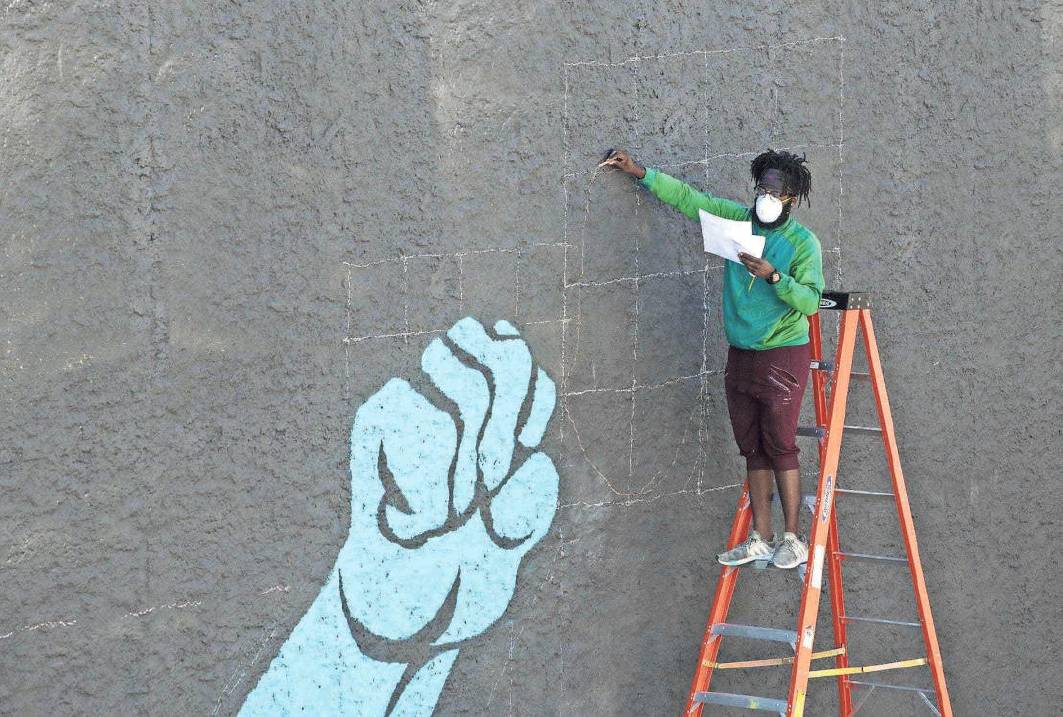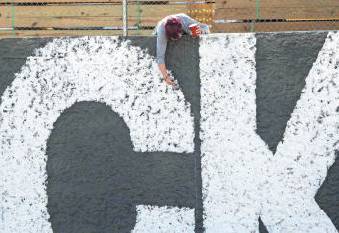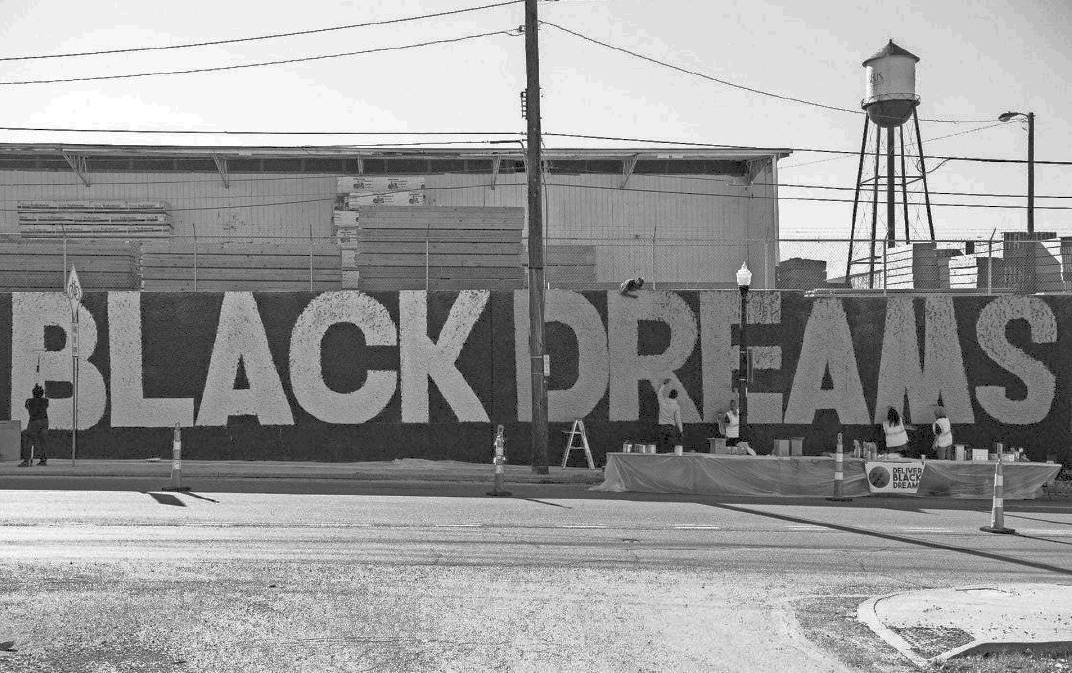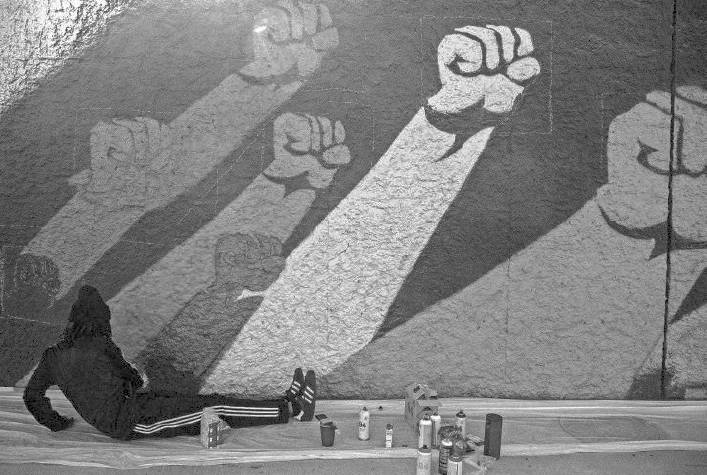Artists of color lead art campaign for equality
Eric LagattaColumbus Dispatch USA TODAY NETWORK
The artists were a few hours into painting a large-scale mural advocating for the dignity of Black people when the news hit.
The mural’s words – “Deliver Black Dreams” and “It’s For All Of Us” – had just begun to take shape Saturday on a retaining wall on Fifth Avenue in the Milo-Grogan neighborhood when former Vice President Joe Biden was projected to become the 46th president of the United States. Artist Lisa McLymont later recalled the jubilant atmosphere as passers-by began honking their horns in celebration and some artists were moved to tears.
“To be painting this on that kind of day was amazing,” said McLymont, who serves as one of the project’s lead artists along with Marshall L. Shorts.
Later that night, Biden and Kamala Harris – the first woman, the first Black person and the first person of Indian descent to be elected vice president – presented a vision for the country that includes racial justice. After a tumultuous summer characterized by civil unrest, McLymont and other artists noted feeling a glimmer of hope in the message while recognizing that words alone are not enough.
The artists returned Sunday morning to complete the mural and officially introduce a citywide campaign devoted to racial justice and equality. Underscored by raised fists, the mural – the first in a series of six that will be created as part of the city’s “Deliver Black Dreams” campaign – displays a message sharing the name of the project that is painted in hues of red, blue, orange, yellow and white.
Massive in scope, the mural located west of I-71 on Fifth Avenue on a north-facing retaining wall is 2,700-feet long with lettering ranging from eight to 16 feet in height.
“It’s impactful for me as a lead artist to kick off this mural and have it mesh with a positive result in the election for people of color,” said McLymont, a graphic designer at the Columbus Association for the Performing Arts. “Biden is saying the right things, but we’ll have to see what they do.”
In partnership with the Maroon Arts Group, the Greater Columbus Arts Council unveiled the concept for the initiative in October during a virtual public forum and secured $75,000 in funding from the city of Columbus. The money will cover artists’ stipends and supplies for a series of public installations, said GCAC spokeswoman Jami Goldstein.
“We’re in this for the long haul,” Goldstein said. “In our lifetime, I don’t see us not being able to focus on making sure that equity is at the forefront of our work.”
The first phase of the campaign centers on hiring artists of color to paint public murals in Columbus through next fall. Approval for the first mural in Milo-Grogan came Oct. 21 from the Columbus Art Commission, which has authority over the design and placement over any public installation.
The arts commission also authorized temporarily displaying across the city dozens of colorful murals painted on plywood that were used to protect businesses during this past summer’s Black Lives Matter protests. (McLymont, a member of the commission, recused herself from the vote.) Those works, created in June as part of the #ArtUnitesCbus initiative, now can be viewed through Martin Luther King Jr. Day at various locations, including on High Street in the Short North and at Coleman’s Pointe on the Scioto Mile.
Other venues already have expressed interest in exhibiting the plywood murals in the future, Goldstein said.
McLymont and Shorts envision the “Deliver Black Dreams” campaign as a vector for keeping racial justice issues at the forefront of the conversation – at least in Columbus. Though the multi-year campaign is still being defined, the lead artists seek to use public art as a launching point to foster conversation and spark tangible advances for the Black community across sectors such as health care, education and criminal justice.
“We wanted to connect it to something that was larger than just art,” said Shorts, 37, a founding member of the Maroon Arts Group and designer and principal at creation firm Artfluential.
As “Deliver Black Dreams” progresses, organizers hope to establish community partnerships and develop programming and outreach efforts that include the mentorship of younger Black artists. Additional facets of the campaign include cash awards to Black filmmakers and photographers to tell the story of the protests, as well as privately funded public murals.
The work on the first mural was slated to commence the first weekend of November but was delayed by inclement weather. Instead, artists began painting amid the aftermath of a momentous election with far-reaching consequences both locally and nationally.
Artist Hakim Callwood, who assisted in painting many of the debut mural’s raised fists, was inspired by the project’s intent to beautify the city and rally people to advocate for meaningful change.
“Art and storytelling are two of the most important things in history because it’s how we communicate and express ourselves to each other,” said Call-wood, 27, a Downtown resident. “It gives people something to champion.”
McLymont pointed to Columbus voters overwhelmingly approving the creation of a new citizen oversight panel of the Columbus Division of Police as a step in the right direction. The issue – whose inclusion on the ballot was influenced by sustained social justice demonstrations this summer – could be symbolic of the type of grass-roots accomplishments encouraged by the “Deliver Black Dreams” project, she said.
“The arts is usually the first to step forward to create space for issues,” McLymont said. “It shows how art can make change and it helps educate people in how to make this happen.” elagatta@dispatch.com
@EricLagatta



